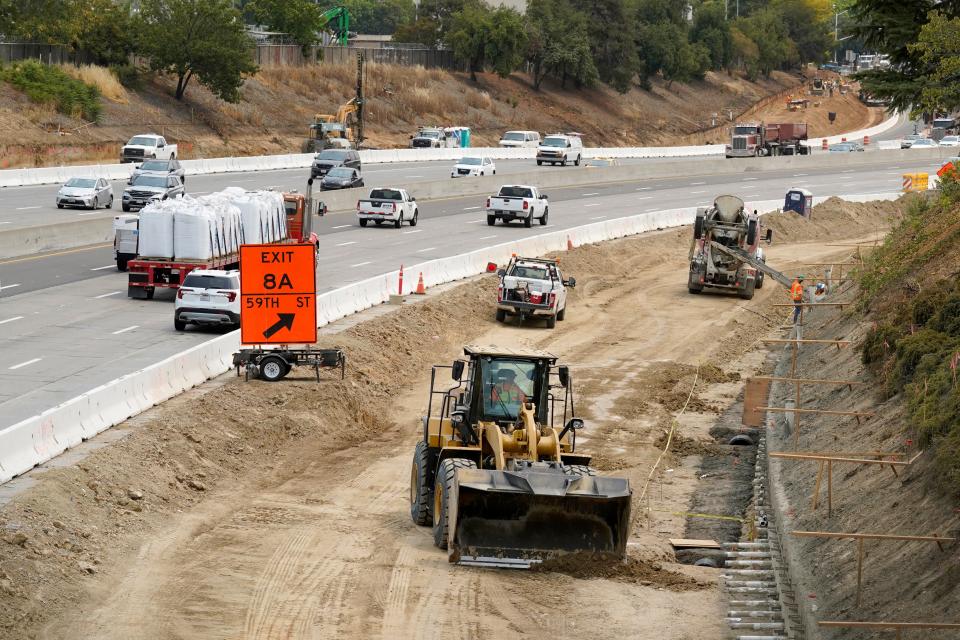Biden reverses Trump to restore environmental law on highways, bridges, other projects
- Oops!Something went wrong.Please try again later.
- Oops!Something went wrong.Please try again later.
The Biden administration moved Tuesday to restore federal requirements that government agencies evaluate the environmental impacts of their actions.
President Donald Trump had stripped the provisions from the National Environmental Policy Act. Biden’s move is the latest in a contentious back-and-forth over the law known as NEPA, signed by President Richard Nixon and enacted in 1970.
Supporters argue the law is essential to protect the environment from climate change and ensure federal agencies work with communities to consider alternatives.
“Restoring these basic community safeguards will provide regulatory certainty, reduce conflict, and help ensure that projects get built right the first time,” Brenda Mallory, chair of the White House Council on Environmental Quality, said in a statement. “Patching these holes in the environmental review process will help projects get built faster, be more resilient, and provide greater benefits to people who live nearby.”

Environmental groups applauded Tuesday’s move, expressing hope the Biden administration will go further on restoring policies rolled back during the Trump administration.
Brett Hartl, government affairs director at the Center for Biological Diversity, called Tuesday’s measures a “critical first step toward restoring common-sense environmental safeguards,” but the administration has “a long way to go” and little time to address environmental crises.
“The Biden administration must ensure that every federal decision addresses systemic environmental injustice, climate chaos and the extinction crisis,” Hartl said. “These key protections must be quickly put back in place and then strengthened.”
Critics of the law have long held that it slows down progress and drives up costs for essential infrastructure projects. Opponents of natural gas and oil pipelines often use the National Environmental Policy Act in court to contest the energy sector's plans.
Representatives from that industry decried Tuesday’s actions. Frank Macchiarola, a senior vice president of the American Petroleum Institute, said in a statement that the measures “add more bureaucratic red tape” to energy infrastructure projects, including for wind and solar, when energy costs are rising in the USA and Europe.
“Once again, the administration’s policy actions aren’t matching their rhetoric regarding the need for more American energy production,” Macchiarola said. “We urge the administration to change course and establish a timely and efficient permitting process that supports the energy security needs of the U.S. and our allies overseas.”

But part of the point of environmental regulations is to force a cost on potentially harmful actions that might otherwise be underpriced by the free market, said Leah Brooks, an economist at George Washington University who has studied U.S. infrastructure project costs.
"If it's not increasing costs, it's not doing what it's supposed to do," Brooks said.
Brooks believes placing a statute of limitations on how long the public can legally challenge a project under NEPA would allow time for public concerns to be aired without allowing groups to use the law as a road block to progress on things like public transportation and renewable energy projects.
"There's a reason Texas has the most installed wind energy," Brooks said. "In part, it's because they allow people to build things."
Research has shown that costs to build major infrastructure in the U.S., including publicly popular projects like passenger rail and highways, has increased since the 1950s, even after adjusting for inflation. It now costs more to build projects like high-speed rails and commuter trains in the U.S. than even in European countries with robust environmental laws like France and Germany.
But environmental groups with a history of using NEPA to raise legal challenges say the law is one of the best tools to combat potentially harmful projects, particularly in communities with little political power.
To address project delays, Kabir Green, director of federal affairs for the Natural Resources Defense Council, recommends invigorating NEPA so that federal agencies can be proactive in identifying concerns instead of waiting for them to be raised by the public.
"We need to have honest conversations about how to make sure that, say, the clean energy revolution is able to move forward as quickly as possible," Green said. "But NEPA is a tool that needs to be at the heart of that process, not sidelined. It's a tool to make sure that you're being smart about your planning and that you're taking into account communities."
This article originally appeared on USA TODAY: Biden reverses Trump, restores climate review to environmental law

